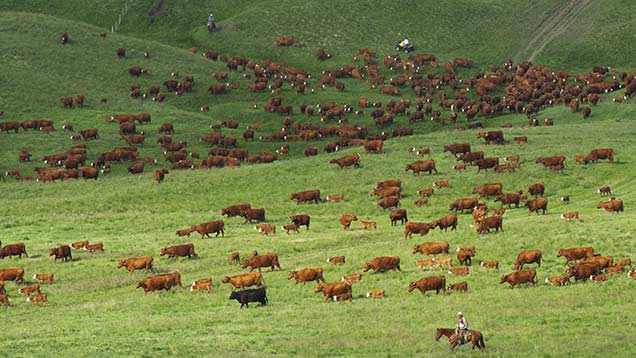NFU rebuffs report calling for switch to veggie diets
 ©Image Broker/Rex Shutterstock
©Image Broker/Rex Shutterstock The NFU has hit back at a report which claims a widescale switch to vegetarianism would tackle environmental issues such as greenhouse gas emissions and biodiversity losses.
Researchers from the University of East Anglia and the University of Greifswald, Germany, studied the long-term effects of meat production on climate and biodiversity.
Their report concluded that the livestock sector had “such a deep and wide-ranging environmental impact that shifting diets should rank as one of the leading focal themes for sustainability policy”.
See also: 10 views on cutting greenhouse gas
The report added that meat production was linked to 18% of global greenhouse gas (GHG) emissions through forest clearance and methane emitted by animals.
It also said that meat eating used excessive amounts of water while chemicals from pesticides used for feed crops played a role in deteriorating water quality.
Co-author Tim O’Riordan from the University of East Anglia told the Daily Mail newspaper that global consumption of meat was likely to soar as people became wealthier.
“A vital role for science is to inform and help consumers to switch to healthier non-livestock related diets,” Prof O’Riordan said.
Both authors added that they were hopeful more people would become vegetarians.
But NFU climate change adviser Ceris Jones said that UK farming had a good story to tell on its work to reduce GHG emissions and on its contribution to mitigating its impact on the climate.
“UK agriculture’s GHG emissions have decreased by almost 20% since 1990. And the industry in England has committed to making a realistic contribution to meeting the UK’s target of reducing GHGs by 80% by 2050 through the Greenhouse Gas Action Plan,” said Ms Jones.
She said that the pig industry had already exceeded its carbon reduction target, reducing GHGs by 26% in 2012. Its target was 17% by 2020.
“In addition, only 67 litres of piped water is required to produce 1kg beef and 49 litres for 1kg lamb in the UK, which is in contrast to 16,000 litres of water needed to produce 1kg beef as commonly cited.
“Livestock farming also offers much to the country in terms of value. The tourist revenue from areas where a proportion of the land is maintained by beef and sheep production is estimated at £1.49bn,” Ms Jones said.
“Part of the solution also lies in knowledge transfer to emerging economies with higher agricultural GHG emissions [and a greater carbon footprint], which can only come about if the UK strategically maintains a strong livestock production sector and the scientific research and development of these key farming systems,” she said.
